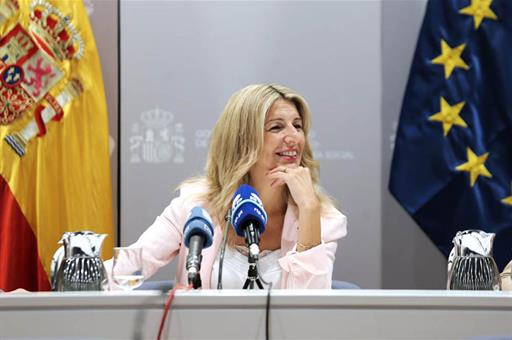Yolanda Díaz sets out the priorities of the Ministry of Labour during the Spanish presidency of the EU Council
News - 2023.7.5
These three areas will be addressed with the aim of contributing to promoting the EU's political and social agenda through labour and employment policies. "From the Ministry of Labour we have promoted decent work with rights, we have promoted the Social Economy and we have closed some twenty major agreements with social dialogue, which have improved the living and working conditions of employees. We want to promote these three priorities at the European level because economic efficiency must go hand in hand with social justice," Díaz explained.
Innovative debates on democracy at work, green collective bargaining, mental health and precarious work will also be promoted.
Strengthening social dialogue
Vis-à-vis the major transformations the labour market is undergoing, social dialogue is an indispensable instrument both to prevent the working conditions of employees from being undermined, and to make progress in terms of labour rights.
The agreements must be made via social dialogue, which provides public policies with stability and ensures the involvement of the social partners in major social challenges. In the coming months, work will be done towards the approval of the Platform Work Directive, inspired by the pioneering Spanish legislation,
The European social partners are already working on an agreement on telework and the right to digital disconnection which, if reached, would be the first binding agreement for the 27 Member States in 13 years.
Another aim during this semester is to encourage democracy at work to promote workers' information and consultation rights and their participation in decision-making. The possibility of reaching collective agreements at European level and of promoting green collective bargaining will also be explored to make companies on the continent more sustainable and productive.
The next Informal Council of Labour and Social Policy Ministers (EPSCO) to be held in Madrid on 13-14 July will focus on social dialogue. A high-level event will also be held in Santiago de Compostela on 21-22 September, which will focus on social dialogue, democracy at work and the green and digital dimensions of collective bargaining.
"We need to strengthen European social dialogue to protect workers' rights, and develop green collective bargaining to facilitate a just green transition in companies," the vice-president reiterated.
Promoting decent work
One of the maxims that the Minister for Work and Social Economy has pursued during her tenure has been decent work, with rights and committed to the defence of equality. The laws passed in the labour field, and the policy instruments developed such as the Equal Pay tool, are moves in this direction.
Decent work also entails safe and healthy working environments, and in this regard the first Council conclusions on mental health and precarious work will be taken forward. In the same line, an event will be held in Toledo on 26 and 27 September focusing on mental health and job insecurity.
With 2023 declared the European Year of Skills, to improve the training of workers and job seekers, Barcelona will host an event related to this subject on 19 and 20 October.
Enhancing the social economy
Promoting the Social Economy in Spain has been another of Yolanda Díaz's main lines of action at the head of the Ministry of Labour. This way of understanding the economy, which accounts for around 10% of GDP and more than two million jobs (direct and indirect), has proven to be more resilient vis-à-vis economic adversity, provides equality, leads to a more equitable redistribution of profits and has become a business formula for combating depopulation.
Díaz, who has pushed for the first UN General Assembly resolution on the Social Economy, aims to encourage the Social Economy in the EU, where it accounts for 8% of the GDP of the 27 Member States and 6.3% of employment.
"The Social Economy is increasingly necessary to tackle growth that is respectful of the environment, that provides for equality and involves a fairer distribution of profits", explained the vice-president.
The Spanish presidency will seek to approve the first Council recommendation on the conditions for a framework for the development of the Social Economy.
In addition, Donostia, which this year has been designated Capital of the Social Economy, will host the European Conference on the Social Economy to be held on 13 and 14 November.
Non official translation





